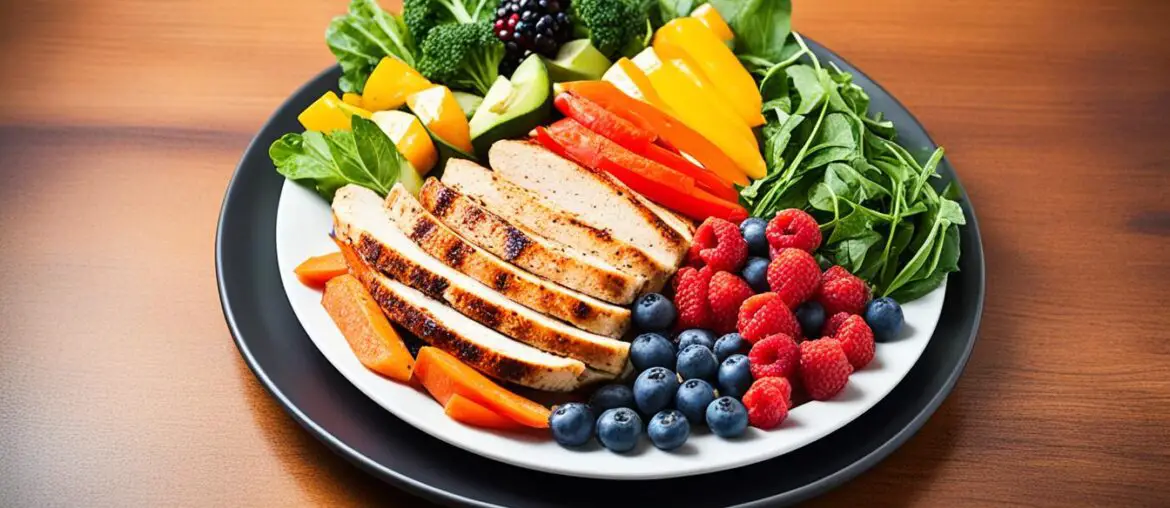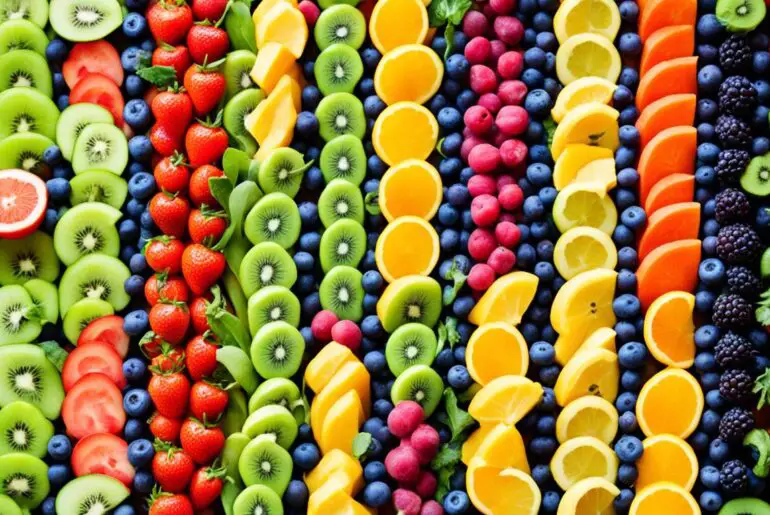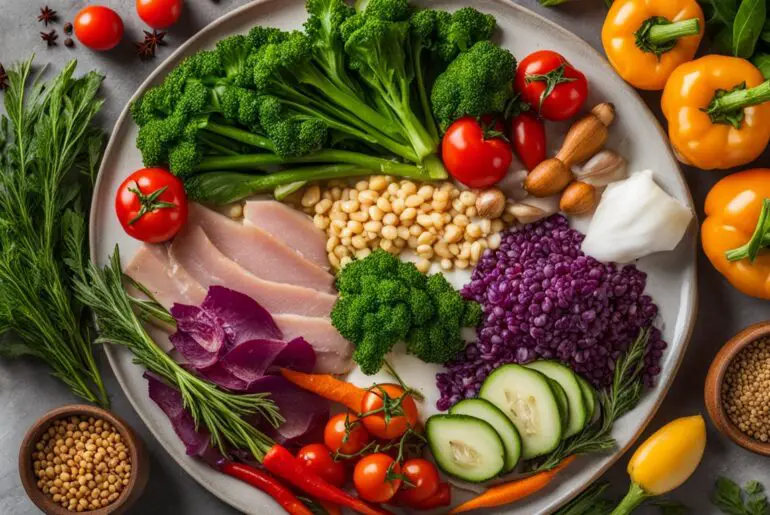Did you know that maintaining weight loss after completing the HCG diet can be a challenge for many individuals? The transition back to regular eating habits requires a thoughtful and sustainable approach to ensure long-term success.
Key Takeaways:
- Gradually increase caloric intake as you transition back to regular eating
- Focus on nutrient-dense foods such as fruits, vegetables, lean proteins, and whole grains
- Stay hydrated by drinking plenty of water
- Monitor portion sizes and practice mindful eating
- Incorporate regular exercise into your routine
Gradually Increase Caloric Intake
After completing the low-calorie phase of the HCG diet, it’s crucial to transition back to regular eating by gradually increasing your caloric intake. This approach helps prevent rapid weight gain and allows your body to adjust to a higher calorie consumption without shocking your system.
Start by slowly adding more calories to your daily meals. Rather than drastically increasing your portions, make small additions to each meal. For example, you can include an extra serving of vegetables, add a tablespoon of healthy fats like avocado or olive oil, or incorporate a small portion of a lean protein source.
This gradual increase in caloric intake allows your body to adapt to the changes and prevents the sudden influx of calories from causing weight gain. By making measured adjustments to your daily meals, you can successfully transition back to regular eating without compromising the progress you’ve made during the HCG diet.
Note: Remember to consult with a healthcare professional or registered dietitian before making any dietary changes or starting a new eating plan.
Focus on Nutrient-Dense Foods
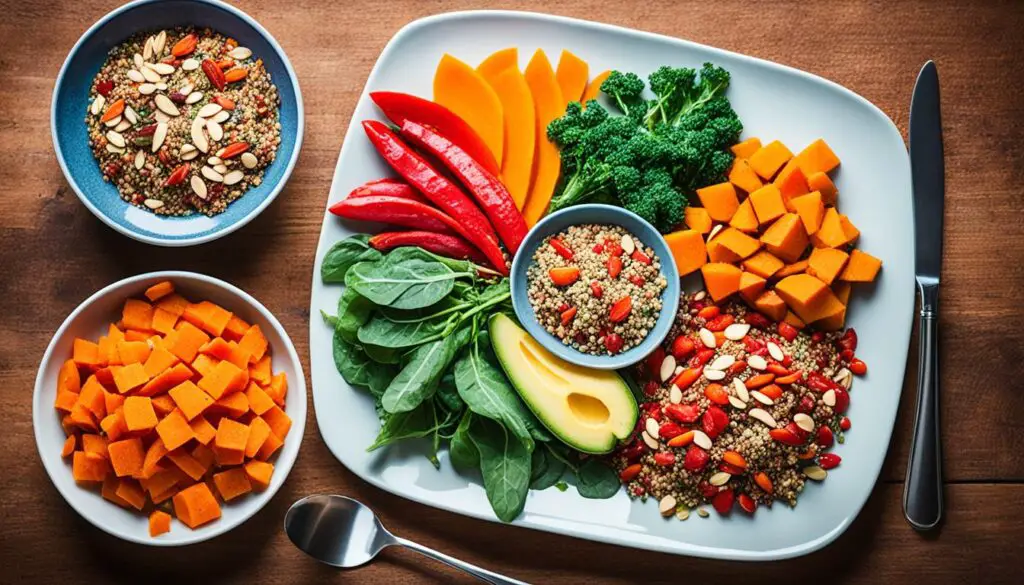
When transitioning back to regular eating after completing the HCG diet, it is important to focus on nutrient-dense foods. These foods provide essential vitamins, minerals, and fiber that support overall health and well-being.
Include a variety of fruits and vegetables in your meals. These colorful additions not only add flavor and texture but also provide important antioxidants and phytochemicals that can help protect against chronic diseases.
Lean proteins, such as chicken, fish, tofu, and legumes are also crucial for a balanced and healthy diet. They provide essential amino acids, vitamins, and minerals needed for various bodily functions.
Whole grains, such as quinoa, brown rice, and whole wheat bread, should also be incorporated into your meals. They are rich in fiber, B vitamins, and minerals, and can help keep you full and satisfied.
By focusing on these nutrient-dense foods, you can ensure that you are getting the necessary nutrients while maintaining a balanced and healthy diet post HCG.
The Benefits of Nutrient-Dense Foods
“Nutrient-dense foods provide a wide range of nutrients that support our overall health and well-being. They are essential for maintaining energy levels, supporting the immune system, and promoting optimal organ function. Incorporating a variety of these foods into our meals not only helps us maintain a healthy weight but also reduces the risk of chronic diseases.” – Dr. Emily Thompson, Registered Dietitian
| Fruits | Vegetables | Lean Proteins | Whole Grains |
|---|---|---|---|
| Apples | Broccoli | Chicken breast | Brown rice |
| Oranges | Spinach | Tofu | Quinoa |
| Berries | Carrots | Fish | Whole wheat bread |
| Avocados | Bell peppers | Lentils | Millet |
Include these nutrient-dense foods in your post HCG meals to ensure a well-rounded and nutritious diet. Experiment with different recipes and flavors to keep your meals exciting and enjoyable.
Stay Hydrated
Proper hydration plays a crucial role in maintaining overall health and supporting weight loss efforts. When it comes to post HCG diet, staying hydrated becomes even more important to control hunger and prevent overeating. Adequate hydration helps keep your body functioning optimally and helps you distinguish between hunger and thirst cues.
One of the simplest ways to stay hydrated is by drinking plenty of water throughout the day. Water is essential for maintaining proper bodily functions, regulating body temperature, and supporting digestion.
“Drinking water throughout the day can help control hunger and prevent overeating by keeping you feeling fuller.”
Aim to drink at least eight glasses of water daily to ensure you stay adequately hydrated. It’s a good idea to keep a water bottle with you at all times, whether you’re at work, running errands, or exercising. Taking regular sips of water can help curb cravings and prevent mindless snacking.
In addition to water, you can also include other hydrating beverages such as herbal tea, infused water, or unsweetened beverages like sparkling water or flavored water. However, be cautious of sugary drinks or beverages with added calories, as they can undermine your weight loss efforts.
“Hydrating beverages like herbal tea and infused water can add variety and flavor while keeping you hydrated.”
It’s important to note that individual hydration needs may vary depending on factors such as age, activity level, and climate. If you engage in intense physical activity or live in a warm climate, you may need to increase your water intake accordingly.
Remember, staying hydrated is not only beneficial for weight management but also for overall health and well-being. So, make it a habit to prioritize hydration throughout the day to control hunger, prevent overeating, and support your post HCG journey.
Monitor Portion Sizes
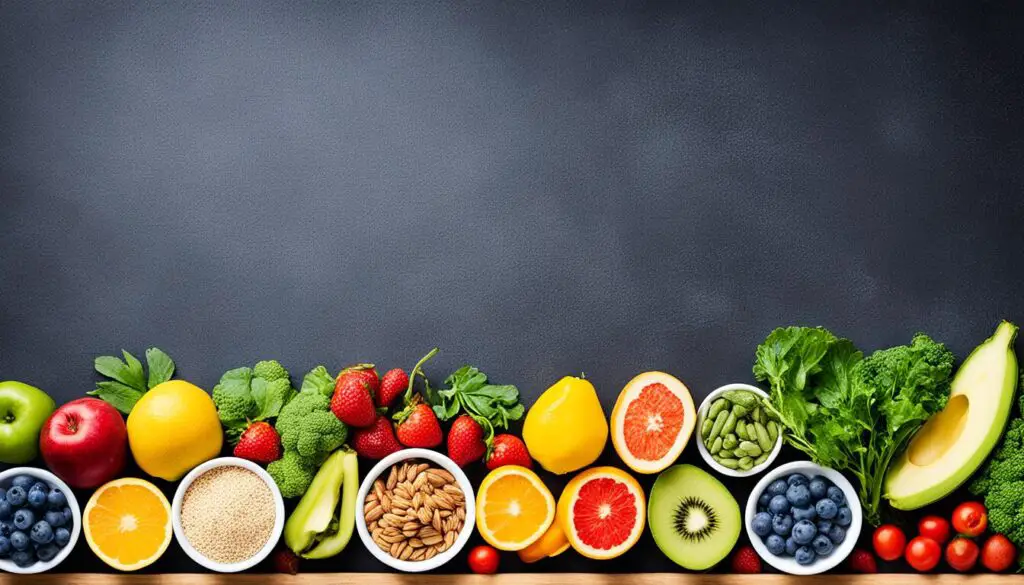
As you transition back to regular eating after completing the HCG diet, it is important to monitor your portion sizes. Being mindful of how much you eat can help prevent overeating and support your weight loss maintenance journey. By paying attention to your body’s hunger and fullness cues, you can eat until you are satisfied without overindulging. Portion control plays a crucial role in maintaining a healthy weight and preventing unnecessary weight gain.
One effective strategy for monitoring portion sizes is practicing mindful eating. Mindful eating involves being present and aware of your eating experience, tuning in to the taste, texture, and satisfaction derived from each bite. By savoring your food and eating slowly, you allow your brain to register feelings of satiety, reducing the chances of overeating.
Another helpful tip is to visually gauge portion sizes by using your hand as a guide. For example, a serving of protein such as chicken or fish should be about the size and thickness of your palm, while a serving of grains or starchy vegetables like rice or potatoes should be the size of your clenched fist. This simple method provides a quick and easy way to estimate appropriate portion sizes without the need for measuring cups or scales.
Additionally, planning your meals in advance and using smaller plates can also aid in portion control. By taking the time to plan your meals and snacks, you can ensure that you are incorporating proper portion sizes into your daily eating routine. When serving your meals, using smaller plates or bowls creates the illusion of a fuller plate, making it easier to maintain a balanced and appropriate portion size.
Remember that portion control is not about depriving yourself of certain foods, but rather about finding a healthy balance that supports your weight loss maintenance goals. It allows you to enjoy a variety of foods while keeping your calorie intake in check.
By monitoring your portion sizes and practicing mindful eating, you can prevent overeating post HCG and successfully maintain your weight loss. Incorporating portion control into your daily routine is a valuable habit that promotes sustainable eating and supports long-term weight management.
Incorporate Regular Exercise
Regular physical activity plays a crucial role in maintaining a healthy weight and overall well-being. To support sustainable weight management and promote a healthy lifestyle, it is essential to incorporate regular exercise into your routine. Physical activity not only helps you burn calories but also improves your cardiovascular health, boosts mood, and increases energy levels.
When it comes to exercise, it is recommended to aim for at least 150 minutes of moderate-intensity aerobic activity per week. This can include activities such as brisk walking, cycling, swimming, or dancing. Engaging in these types of exercises gets your heart rate up, helps burn calories, and contributes to maintaining a healthy weight.
In addition to aerobic exercise, it is also important to include strength training exercises in your fitness routine. Strength training helps build and maintain lean muscle mass, which is essential for a healthy metabolism and overall strength. Incorporating exercises such as weight lifting, resistance training, or bodyweight exercises into your routine can help increase muscle definition, improve bone health, and support sustainable weight management.
Remember to choose activities that you enjoy and that align with your personal preferences and capabilities. Finding physical activities that you genuinely enjoy can increase your motivation to engage in regular exercise and make it a sustainable part of your lifestyle.
By incorporating regular exercise into your daily routine, you not only support maintaining a healthy weight but also enhance your overall well-being. Stay active, stay motivated, and reap the countless benefits that physical activity brings. Remember to consult with a healthcare professional before starting any exercise program, especially if you have any underlying health conditions.
Listen to Your Body
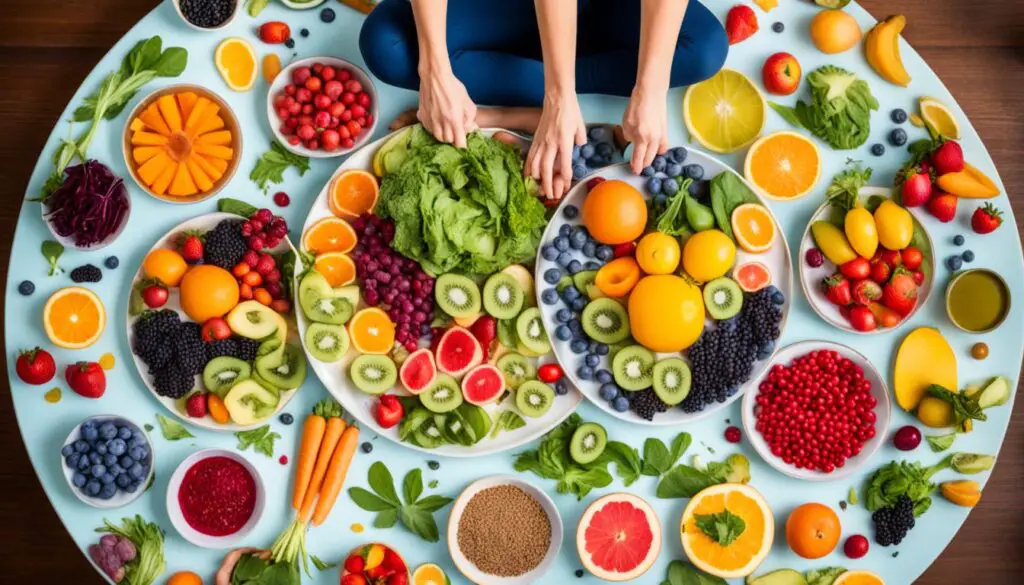
As you transition back to regular eating after completing the HCG diet, it’s crucial to listen to your body and pay attention to how different foods make you feel. Each person’s body has unique reactions to foods, and it’s important to make individual food choices that support your health and well-being.
As you reintroduce foods into your diet, take note of any reactions or sensitivities you may experience. Notice how certain foods make you feel energized and satisfied, while others may leave you feeling bloated or sluggish. By listening to your body’s signals, you can make personalized choices that align with your post HCG diet goals.
Remember, a personalized approach to food is essential in the post HCG diet phase. What works for someone else may not work for you, and that’s okay. Your body knows best, and by paying attention to its unique reactions to foods, you can make informed decisions about what to include in your meal plan.
Consider keeping a food journal to track your meals and note how different foods affect you. This can help you identify patterns and make adjustments accordingly. For example, you may discover that certain foods cause digestive discomfort or headaches, while others leave you feeling energized and nourished.
“By listening to your body and making food choices that honor your unique needs, you can build a sustainable and healthy approach to eating after the HCG diet.”
Adopting a personalized approach to food can also empower you to make mindful choices that support your long-term health and weight management goals. By honoring your body’s signals and preferences, you can create a sustainable eating plan that works for you.
Tips for Listening to Your Body
- Take note of any physical symptoms or discomfort after eating certain foods.
- Pay attention to your energy levels and mood throughout the day, especially after meals.
- Experiment with different food combinations and observe how they impact your digestion and overall well-being.
- Trust your cravings and honor them in a healthy and balanced way.
- Seek guidance from a healthcare professional or registered dietitian if you have specific dietary concerns or questions.
By embracing a personalized approach to your post HCG diet journey and listening to your body’s unique reactions to foods, you can create a sustainable and health-promoting eating pattern that supports your long-term well-being.
Seek Professional Guidance

If you have any concerns or questions about transitioning back to regular eating after the HCG diet, it is highly advised to seek professional guidance from a registered dietitian or nutritionist. Their expertise and knowledge in the field of nutrition can provide you with personalized recommendations and support to help you maintain your weight loss and continue on a path of healthy eating.
A registered dietitian or nutritionist can assess your individual needs, take into account any underlying health conditions, and develop a tailored plan that meets your specific requirements. They can guide you in making informed food choices, creating a balanced meal plan, and navigating any challenges you may face during the post HCG diet phase.
By collaborating with a professional, you can gain access to evidence-based information on nutrition and weight loss maintenance, ensuring that you make sustainable and informed decisions regarding your health and wellness.
Furthermore, a registered dietitian or nutritionist can help you address any potential deficiencies in your diet and offer guidance on supplementation if necessary. They can also provide ongoing support and accountability to help you stay motivated and committed to your weight loss goals.
Remember, everyone’s journey is unique, and seeking professional guidance will allow you to receive the individualized care and attention you need to succeed in maintaining your weight loss and optimizing your overall health.
The HCG Diet and Weight Loss Maintenance
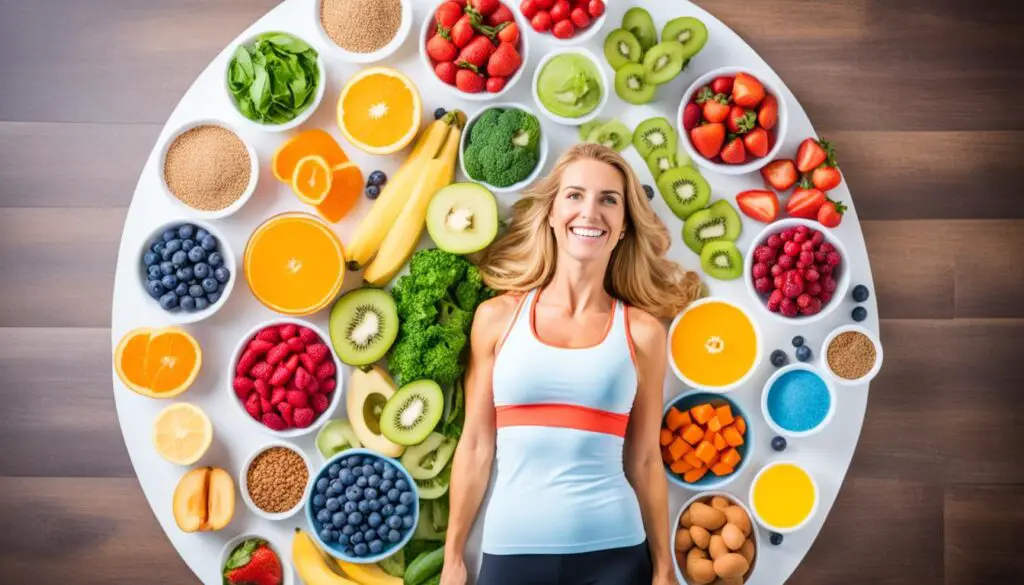
Weight loss on the HCG diet is often touted as effective, but experts caution against its use. The HCG diet involves extreme calorie restriction rather than the HCG hormone itself, making it an unsafe and unhealthy approach to weight loss. There is a lack of substantial evidence supporting the effectiveness of the HCG diet. It is crucial to prioritize safety and choose sustainable methods for weight loss and maintenance.
Calorie Restriction and Extreme Weight Loss
The HCG diet heavily relies on calorie restriction to induce weight loss. Followers of the diet are typically limited to a mere 500-800 calories per day. While this extreme calorie deficit can lead to rapid weight loss, it is important to note that such drastic measures are not sustainable in the long term. Severe calorie restriction may also result in nutritional deficiencies and negatively impact overall health.
The Effectiveness of the HCG Diet
Contrary to popular belief, the effectiveness of the HCG diet for weight loss is not due to the HCG hormone itself. The HCG hormone, typically administered via injections or oral drops, is thought to suppress hunger and preserve muscle mass during the low-calorie phase. However, studies show that any weight loss experienced on the HCG diet is primarily attributed to the significant calorie deficit rather than the hormone. The limited body of evidence available indicates that the HCG diet is no more effective than other calorie-restricted diets.
“There is no scientific evidence to suggest that HCG has any benefit for weight loss. Any weight loss on the HCG diet is due to severe calorie restriction, not the HCG hormone itself.”
– American Society of Bariatric Physicians (ASBP)
The Safety of the HCG Diet
While the HCG diet may tempt individuals with its promise of rapid weight loss, it is vital to prioritize safety. The severe calorie restriction coupled with the lack of essential nutrients in the diet can have adverse effects on the body. Additionally, the use of HCG for weight loss purposes is considered off-label and not approved by the FDA. The HCG diet is widely regarded as an unsafe and potentially risky approach to weight loss.
To achieve sustainable weight loss and maintenance, it is advisable to follow a balanced, nutritious diet that provides adequate calories and essential nutrients. Consulting with a healthcare professional or registered dietitian can help create a personalized plan that supports long-term weight management and overall well-being.
| Weight Loss Method | Effectiveness | Calorie Restriction | Safety |
|---|---|---|---|
| HCG Diet | Not scientifically proven to be effective | Extreme calorie restriction of 500-800 calories per day | Considered unsafe, unhealthy, and illegal |
| Well-Balanced Diet | Supported by scientific research | Calorie deficit based on individual needs | Focused on providing adequate nutrition and safety |
Evidence-Based Weight Loss Solutions
When it comes to weight loss, prioritizing evidence-based approaches is crucial. Instead of resorting to extreme diets like the HCG diet, consider adopting a sustainable lifestyle that includes regular physical activity, a well-balanced diet, and appropriate calorie intake. Slow and steady weight loss, combined with healthy habits, is more likely to lead to long-term success and overall well-being.
Conclusion
Transitioning back to regular eating after completing the HCG diet requires a mindful approach to maintaining weight loss and embracing sustainable eating habits. By gradually increasing caloric intake, focusing on nutrient-dense foods, staying hydrated, monitoring portion sizes, incorporating regular exercise, listening to your body, and seeking professional guidance, you can successfully navigate this phase of your weight loss journey.
Remember, sustainable eating habits post HCG are crucial for long-term weight management and overall well-being. It is important to adopt a balanced and healthy diet that includes a variety of fruits, vegetables, lean proteins, and whole grains. Staying hydrated and controlling portion sizes will help prevent overeating and promote a healthy weight.
Additionally, incorporating regular exercise into your routine and listening to your body’s individual needs are key factors in maintaining your weight loss. By utilizing these strategies and seeking guidance from a registered dietitian or nutritionist, you can personalize your approach and ensure the sustainability of your eating habits after the HCG diet.
In summary, sustainable eating habits post HCG involve a holistic approach to health that focuses on nourishing your body with nutrient-dense foods, practicing portion control, staying active, and seeking professional advice when needed. By following these guidelines, you can achieve long-term success in maintaining your weight loss and embracing a healthy lifestyle.
FAQ
How should I transition back to regular eating after completing the HCG diet?
Gradually increase your caloric intake and focus on nutrient-dense foods to maintain a balanced and healthy diet. Stay hydrated, monitor portion sizes, incorporate regular exercise, listen to your body, and consider seeking professional guidance for personalized recommendations.
How can I prevent rapid weight gain after completing the HCG diet?
By gradually increasing your caloric intake and focusing on nutrient-dense foods, you can help your body adjust to a higher calorie intake without causing rapid weight gain.
What are nutrient-dense foods?
Nutrient-dense foods are those that provide essential vitamins, minerals, and fiber. Examples include fruits, vegetables, lean proteins, and whole grains.
Why is staying hydrated important after completing the HCG diet?
Staying hydrated is important for overall health and can also help control hunger and prevent overeating. Aim to drink at least eight glasses of water daily.
How can I monitor portion sizes as I transition back to regular eating?
Pay attention to your body’s hunger and fullness cues, and eat until you’re satisfied, not overly full. Practicing portion control is key to maintaining your weight loss and preventing overeating.
How important is regular exercise after completing the HCG diet?
Regular physical activity is essential for maintaining a healthy weight and overall well-being. Aim to incorporate at least 150 minutes of moderate-intensity exercise per week and include strength training exercises.
Should I pay attention to how different foods make me feel after completing the HCG diet?
Yes, it’s important to listen to your body and make food choices that support your individual health and well-being. Take note of any reactions or sensitivities as you reintroduce foods into your diet.
Should I seek professional guidance after completing the HCG diet?
Yes, consider seeking guidance from a registered dietitian or nutritionist for personalized recommendations and support in maintaining your weight loss and continuing a path of healthy eating.
Is the HCG diet an effective and safe weight loss method?
No, experts warn against the HCG diet as there is no substantial evidence to support its effectiveness. Weight loss achieved on this diet is due to extreme calorie restriction rather than the HCG hormone itself. The HCG diet is considered unsafe, unhealthy, and illegal.
What are the key takeaways for maintaining sustainable eating habits post HCG?
Transition gradually, focus on nutrient-dense foods, stay hydrated, monitor portion sizes, incorporate regular exercise, listen to your body, and seek professional guidance. These strategies will help you maintain your weight loss and continue on a path of healthy eating.

